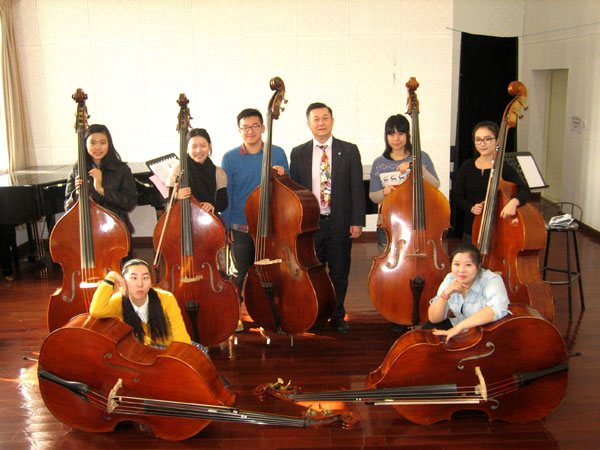

 |
|
Lu Yuanxiong runs classes at music schools in China to bring music and musicians between the US and his homeland. Provided to China Daily |
As the largest instrument in the string section of an orchestra, the double bass hardly gets the attention it deserves, Lu Yuanxiong believes.
The 47-year-old has worked with the double bass for most of his life and is ready to share its beauty with as many people as possible.
It is a beautiful instrument that "speaks everybody's voice, and you can sing along with it", says the professor of double bass at the music school of Texas Christian University.
A musician from Shanghai, he has lived and worked in the US for more than 30 years, first as a student, then a soloist and orchestra player, before joining the TCU faculty.
He is the founder of the TCU International Double Bass Festival, an annual week of lectures, concerts and master classes since 2012. For more than 10 years, Lu has traveled at least three times a year between China and the US, bringing music and musicians both ways.
Lu and his colleagues will stage a chamber concert at Shanghai Oriental Art Center on Dec 21. They give concerts in China every year, though the box office income cannot cover their travel expenses. "Sometimes when the funding is insufficient, I pay for my own flight," Lu says.
"We give one-on-one master classes at the Shanghai Conservatory of Music and music schools in other parts of China," he says.
Lu also handpicks outstanding students of double bass and other string instruments to study in the US.
"China's music schools put emphasis on solo playing skills but don't prepare their students well for orchestra work," Lu points out as the problem with double bass teaching in China's music education system.
To become a soloist, one must first become competent working as an instrumentalist in an orchestra.
Forging a career path as a double bassist is hard, Lu says. "Double bass players have fewer opportunities to further their studies abroad than pianists or violinists," Lu says. He plans to choose a few students to study in the US every year for the coming 10-20 years.
"Chinese students are sensitive, intelligent and hardworking, resourceful at problem solving. We just need a good opportunity to take off." He says that he is ready to give them the opportunity.
Earlier this year a student at the Shenyang Conservatory of Music, who Lu has recruited for the post-graduate program at TCU, failed to get a visa to the US.
When the student told his professor that he was denied a visa because of his deficiency in English, he thought that was the end of his dream. But Lu was not ready to give up on him.
"I wrote a letter to the visa officer in Shenyang, explaining that language ability is not of such importance to music training as other studies, and then after consulting my friends in the US, I addressed the letter to the student, instructing him to explain the situation to the consulate," he says.
"I will help him to enroll in a language school as soon as he arrives in the US."
Lu also helps his Chinese students to find apartments, roommates, Chinese groceries, second-hand cars and part-time jobs in the US.
Lu was from Shanghai and started music training at the age of 6. When he was enrolled in the middle school attached to the Shanghai Conservatory of Music at 12, he was taller than most of his classmates. The teacher suggested he take up the double bass, as the instrument was too large for other children to maneuver.
"I was so impressed by the beauty of the double bass," Lu recalls. "I became intrigued ever since."